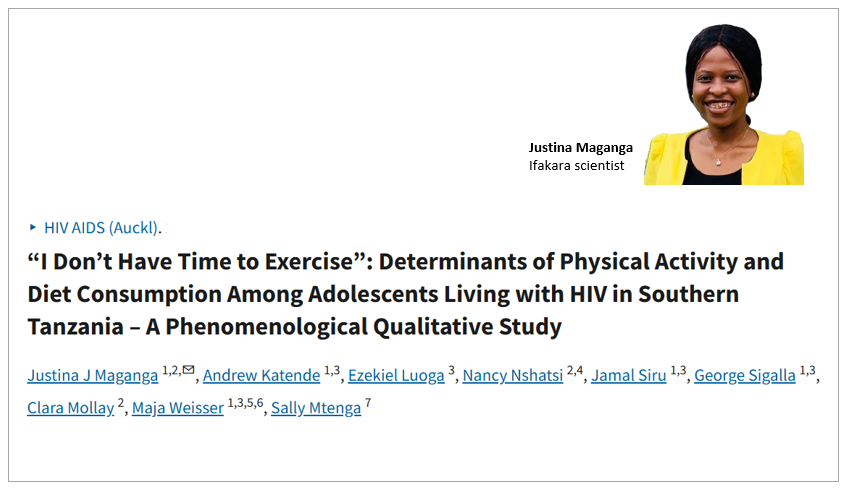
LIFESTYLE BEHAVIORS: Teens living with HIV share struggles with fitness and diet

A recent study by the Ifakara Health Institute has shed light on significant challenges faced by adolescents living with HIV (ALHIV) in adopting healthy diets and staying physically active—two critical behaviors for preventing non-communicable diseases (NCDs).
Published on HIV/AIDS, the study was carried out between May and July 2024 at the Chronic Diseases Clinic of Ifakara (CDCI) in Morogoro, Tanzania. Researchers engaged adolescents aged 15 to 19, along with their parents and caregivers, to understand the realities shaping their daily health choices.
The findings were striking: while many adolescents expressed a clear desire to lead healthier lifestyles, they are often hindered by environmental and socioeconomic barriers. Limited access to nutritious foods, lack of safe spaces for exercise, and competing household priorities were just some of the factors making it difficult for teens to make positive changes.
This research underscores the need for integrated interventions that address not just individual behaviors, but also the broader structural and social challenges that ALHIV face in pursuing healthier lives.
Barriers to exercise: Time, stigma, and gender norms
Barriers to physical activity ranged from personal time constraints and limited awareness to social discouragement and restrictive norms and beliefs. Some adolescents reported lacking time due to school demands, while others feared stigma.
Gender norms also played a role in discouraging them from participating in exercise. For instance, some teens recalled being told that “girls are meant to do all the housework and shouldn’t play around like boys.”
Inadequate recreational facilities within their communities added to the problem, and as one teen commented, "Areas for exercise are few and far from home. Maybe if I lived near a stadium like the national stadium, I would exercise—even if it meant squeezing my schedule."
Poor diet choices: Limited control and financial struggles
When it came to diet, the challenges were even more complex. Many adolescents reported having little control over what was served at home due to parental decision-making. Some also expressed concerns about gaining weight, especially those on antiretroviral medication, which can affect appetite and body shape.
Financial hardships and large family sizes often meant limited access to nutritious meals, meanwhile, the growing availability of fast food in their communities further undermined healthy eating habits.
Parents, caregivers acknowledge the struggles
Parents echoed many of these concerns, acknowledging the economic hardships and lack of nutritional education as key barriers to making healthier choices for their children. Similarly, caregivers shared the same view, noting that limited nutrition knowledge is common in many households.
Implementing nutrition support programs could help tackle these challenges, suggests the scientists, who underscore the importance of integrated strategies to address the social determinants of health among adolescents living with HIV (ALHIV).
Applying the socio-ecological model
While the stories were personal, the patterns were consistent. The study applied the socio-ecological model to categorize the influences at three levels: personal, interpersonal (family and friends), and community. Across all levels, barriers to healthy behaviors emerged—ranging from lack of knowledge and low household income to the increasing presence of fast-food vendors in local neighborhoods.
A call for policy and program reforms
The researchers say the findings are a wake-up call. They underscore the need for multi-level interventions, recommending that physical activity and nutrition education be integrated into HIV care programs. The study also calls for stronger engagement with parents and caregivers to create supportive environments for adolescent health.
"Generally, the findings from this study suggest the need to review existing policies and programs to better address ALHIV’s well-being needs," the scientists noted. "Specifically, the study calls for the National Guidelines for the Management of HIV and AIDS in Tanzania to include strategic objectives that support physical activity and healthy diet consumption for PLHIV, including adolescents."
Ifakara scientists behind the study
The study was led by Justina Maganga, a scientist at Ifakara Health Institute, with contributions from fellow Ifakara researchers Andrew Katende, Ezekiel Luoga, Nancy Nshatsi, Jamal Siru, George Sigalla, Clara Mollay, Maja Weisser, and Sally Mtenga. It was supported by the Training Department at Ifakara Health Institute.
Read the publication here.
